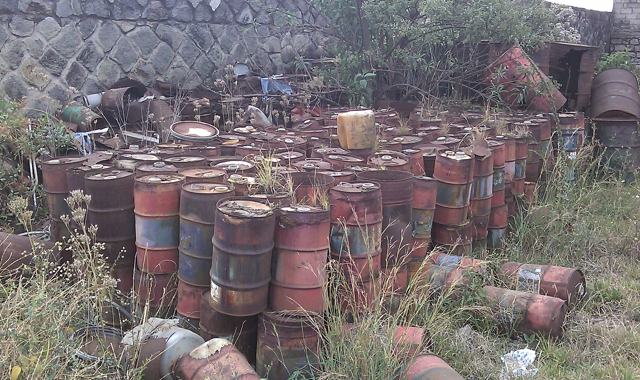
NRI is assisting with the process of eliminating obsolete pesticides in Africa through its involvement in projects in Cameroon and Ethiopia. Obsolete pesticides are herbicides, fungicides, rodenticides, nematicides, insecticides, including pesticides for veterinary and public health applications, that can no longer be used because either:
- The product has passed its expiry date, or
- The product is banned, no longer registered for use, or has never been registered
- The product cannot be identified either because the label is damaged and can no longer be read, or because it does not have a label
- The product is no longer wanted and is never likely to be used again on the farm.
They represent a risk to human health and the environment, and the clock is always ticking. Drums begin to leak, bags burst spilling dust, and the problem becomes more dispersed and ever more expensive to manage.
NRI's Hans Dobson (Agriculture Health and Environment Group) has been contracted by CropLife International (CLI) to manage a project in Cameroon that is bringing together the Ministry of Agriculture and Rural Development, the Yaoundé Initiative Foundation (a UK/Cameroon not for profit company), CropLife Cameroon and FAO to prepare a full national inventory of obsolete pesticides, safeguard them (repackage, collect and store safely), for eventual disposal by high temperature incineration in accordance with international regulations. The project has already carried out an emergency operation to eliminate several tonnes of dieldrin — a persistent organic pollutant (POP) — from the north of the country and is now beginning a nationwide outreach programme to encourage holders of obsolete stocks to declare and surrender them to the project. On 15 July, the Vice Prime Minister published an announcement in the national press and on TV, outlining the project and indemnifying any holders of obsolete stocks from any legal or financial responsibility for them, provided they are declared within a 3 month period beginning 1 August 2010.
Hans Dobson and John Linton (NRI Commercial Director) have also been contracted by the World Bank to provide management support over the next 4 months to an obsolete pesticides project in Ethiopia — part of the Africa Stockpiles Programme (ASP). The ASP is an initiative to address the accumulation of obsolete pesticides in Africa. It is implemented by a multi-stakeholder partnership involving multilateral organisations, international NGOs, governments and industry. The programme contributes to the achievement of the objectives of the Stockholm Convention on POPs, the Basel Convention on the Control of Trans-boundary Movements of Hazardous Wastes and their Disposal, the Rotterdam Convention on Prior Informed Consent Procedures for Certain Hazardous Chemicals, and supports the overall objectives of the Strategic Approach to International Chemicals Management (SAICM). The problem has been, and still is, huge in Ethiopia. Predecessor projects run by FAO have disposed of over 2000 tonnes of obsolete pesticides, but the World Bank project has identified another 800 tonnes that need to be destroyed, 400 tonnes of which will be financed by CLI.
But how have these problems arisen? Pesticides can become obsolete and accumulate for a variety of reasons, including inappropriate procurement decisions, changing regulatory circumstances, poor stock management and the appearance and disappearance of unpredictable pests such as locusts. If they are older than the normal 2 year shelf life, they may still be usable, depending on the conditions in which they have been stored, but until their chemical content has been analysed in a laboratory, they are still considered obsolete.
Perhaps more importantly, how can these problems be avoided in future? It is unlikely that the donor community will finance large disposal operations again, and most of the national projects, including Cameroon and Ethiopia, have components that will focus on prevention and/or management of the problem in the longer term. The large pesticide procurements by government that occurred in the past are much less common nowadays, with many pesticides being distributed through the private sector in smaller quantities to individuals or organisations who have more of a vested interest in making good use of their purchases. However, if we accept that pesticides used responsibly can help to boost yields, improve food security and tackle vector-borne diseases in the developing world, then it is likely that their use will increase in future. Despite prevention efforts, it is inevitable that some fraction of the pesticides that are bought will become obsolete. The crucial thing will be to put in place policies and regulations to minimise their accumulation, and to provide a sustainable solution to disposal, perhaps through a levy on sales or other cost recovery scheme to finance disposal by specialist hazardous waste contractors.

